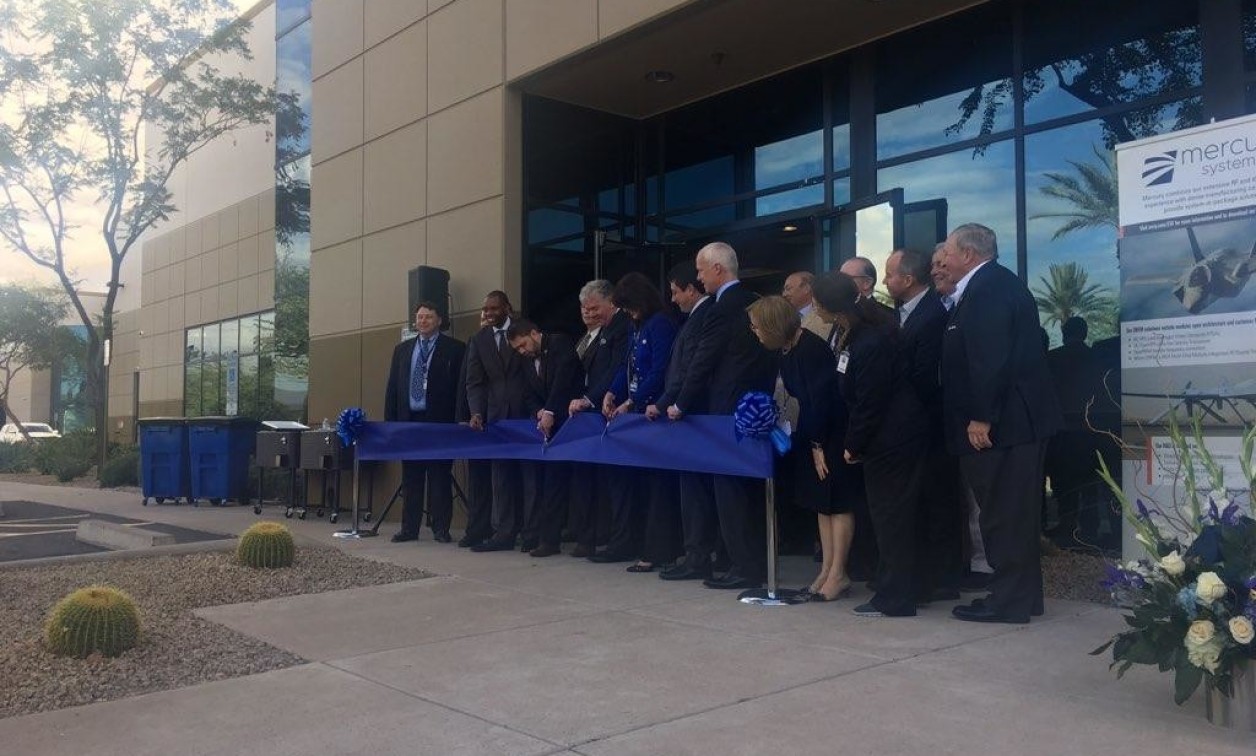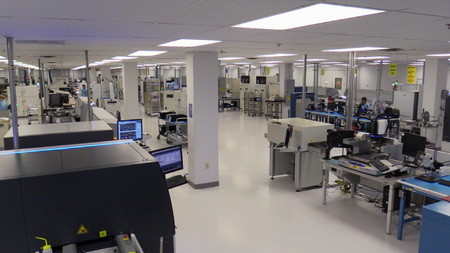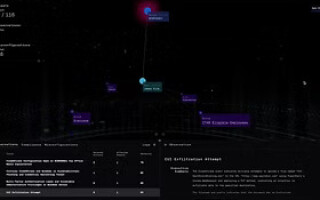Advanced Microelectronics Center open house highlights defense security and job growth
OtherOctober 24, 2017

Mercury Systems recently celebrated the opening of its fourth Advanced Microelectronics Center (AMC), located in Phoenix, Arizona. The open house event highlighted the continuing security challenges in the defense arena, as well as the job growth that the center promises to provide Phoenician residents.
The Phoenix manufacturing location received the Category 1A Trusted Supplier accreditation for design services from the U.S. Defense Department’s Defense Microelectronics Activity (DMEA) organization, paving the way for the company to provide trusted processing systems to warfighters in the field.
The 115,000 square-foot Phoenix AMC facility will focus on producing advanced digital microelectronic solutions, including products that will be deployed in electronic warfare (EW) systems; radar systems; and command, communications, and intelligence (C3I) systems. The newly opened facility will also generate products including solid-state drives (SSDs) and high-density secure memory, such as 4 Gb/8 Gb DDR3 and DDR4 SDRAMs.
Each product coming out of the facility must undergo grueling testing before it can proceed to the next step, which would be integration into systems used in battle.
[caption id="" align="alignnone" width="450" caption="Inside Mercury's AMC facility. Image courtesy of Mercury Systems. "] [/caption]
[/caption]
“The design, manufacturing, and test capabilities of our trusted Phoenix AMC facility provide cost-effective, advanced microelectronics critical to the success of our warfighters around the globe,” said Charlie Leader, Senior Vice President and General Manager of Mercury’s Advanced Microelectronics Solutions group, in a speech at the event. “Accreditation span-ning the design phase through final product testing highlights Mercury’s substantial investment in security and trust as the foundation of our operational cadence. Defense prime contractors can confidently turn to Mercury for custom-engineered memory, storage, and SiP [system-in-package] devices for any defense or aerospace applications.”
Now that Mercury has been named a Trusted Supplier, the company can deliver “commercial electronics for secure sensor and mission processing subsystems” Mercury officials state. “Defense prime contractors have a trusted supply chain partner for application-specific, customized microelectronics without sacrificing security, performance, or SWaP [size, weight, and power] design principles.”
“This is a very exciting time for Mercury Systems as we have continued to grow both in size and capabilities,” Mark Aslett, president and CEO, Mercury Systems, said. “That growth is due, in large part, to our investments in our manufacturing capabilities in a capacity that is discriminating and unique for our industry. We started a few years ago with our state-of-the-art Advanced Microelectronics Centers (AMC) in Hudson, NH, and West Caldwell, NJ, offering world-class radio frequency microwave (RFM) and sensor and mission processing (SMP) manufacturing and integration capabilities. Over the last several months, we have been concentrating our investments in Phoenix to create our AMC around surface-mount technology (SMT) to provide a modern and global manufacturing capability.”
At the event, Mercury President and CEO Mark Aslett – along with the company’s Board of Directors – were joined by Arizona Rep. Ruben Gallego, Arizona state senator Catherine Miranda, and Arizona state representative Reginald Bolding. The Phoenix AMC is the second Mercury manufacturing facility to achieve the DMEA service accreditation.
For more on this facility, click here to view the video.
Congressman Gallego’s own opening remarks delved into his own experience as a Marine Corps infantryman and the importance of technology for today’s warfighter. He went on to state that so many military maneuvers are eventually be executed by a scared young 18- to 20-year-old soldier in the field; the idea behind these advanced systems is to be way ahead of the adversary in terms of technology.
Gallego pointed out that the engineers and technicians – like those at Mercury’s Phoenix AMC – are a critical part of the defense ecosystem that will help to keep the playing field uneven and the U.S. and its allies ahead of the game.
When ArizonaSen. Catherine Miranda took the podium, she promised Mercury Systems that she would do her best to provide the company and the defense industry with the skilled workers needed to populate the local defense ecosystem. With that in mind, the facility has the potential to add more jobs to the area – a huge boost for the economy.
More engineers, technicians, and designers mean adding more shifts to the company’s facility. More shifts at work means that Mercury can continue to provide more trusted products to the system integrators that will use that technology, enabling a faster time to market. Taken together, this means that the company and the industry can speed the pace of getting the technology to the warfighter.





